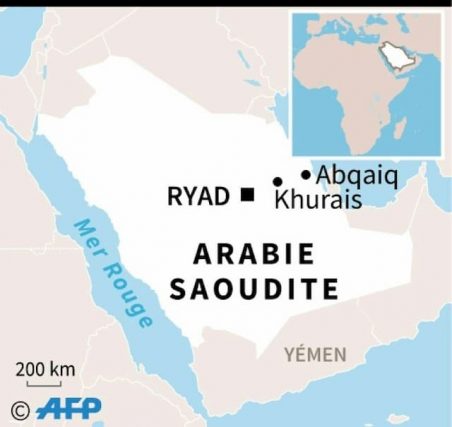Saudi Arabia Oil: Washington “Ready to Fight Back” as Barrel Price Soars

The United States declared itself “ready to respond” to drone attacks on oil installations in Saudi Arabia, which led to a reduction in production
The United States said on Sunday it was “ready to respond” to the drone attacks the previous day against oil installations in Saudi Arabia, which resulted in a halving of production and caused a sharp rise in oil prices.
Read also: Oil: Saudi Arabia strives to restore production halved temporarily
“Saudi Arabia’s oil supply has been attacked. There are reasons to believe that we know the culprit, are ready to retaliate based on the verifications, but we are waiting for the (Saudi) Kingdom to tell us who it believes to be the culprit of this attack, and in what form we should act ! “, Tweeted Donald Trump , who for the first time alluded to a possible military response.
Saudi Arabia oil supply was attacked. There is reason to believe that we know the culprit, are locked and loaded depending on verification, but are waiting to hear from the Kingdom as to who they believe was the cause of this attack, and under what terms we would proceed!
— Donald J. Trump (@realDonaldTrump) 15 September 2019
In a previous tweet, the US president had “authorized the use of oil from the Strategic Petroleum Reserve , if necessary, for a quantity that remains to be defined”.
Rising prices
In early trading Monday morning, oil prices were up sharply and gained more than 10%: the US barrel of WTI rose 10.68% to 60.71 dollars and the barrel of Brent North Sea rose from 11.77% to 67.31 dollars.
Yemeni Houthi rebels, backed by Iran and who have been facing a military coalition led by Ryad for the past five years, have claimed responsibility for the attacks on the facilities of the public giant Aramco.
There is no evidence that this “unprecedented attack on global energy supplies” has come from Yemen, US Secretary of State Mike Pompeo said on Saturday, accusing Iran of being behind the attack and assuring that the United States would work to supply the markets.

Tehran ruled the charges “foolish” and “incomprehensible” by Foreign Ministry spokesman Abbas Mousavi, who hinted that they were intended to justify “future actions” against Iran.
Saudi Crown Prince Mohammed bin Salman, whose country is Iran’s great regional rival, assured that Ryad was “willing and able” to respond to this “terrorist aggression”.
But James Dorsey, a Middle East expert at Singapore’s S. Rajaratnam School of International Studies, has estimated unlikely direct retaliation: “The Saudis do not want an open conflict with Iran … They would like others are fighting for them, but others are reluctant. ”
Sudden reduction in production
Saturday’s explosions sparked fires at the Abqaiq plant, the world’s largest oil processing plant, and the Khurais oil field. According to the Saudi Ministry of the Interior, the attacks did not cause any casualties.
Saudi energy infrastructure had already been hit by the Houthis, particularly in August and May, in retaliation for the Ryad bombing campaign against areas they control in Yemen.
But this strike is of another order: it caused a sharp reduction in the production of 5.7 million barrels per day or about 6% of global supply.
This could undermine investor confidence in Aramco, the oil giant preparing for its IPO. The operation was delayed several times, mainly due to adverse conditions.
As markets closely monitor Saudi Arabia’s reaction, Aramco CEO Amin Nasser said “jobs” are “underway” to restore production.
Prince Abdel Aziz ben Salmane recently appointed Minister of Energy, assured that part of the decline in production would be offset by stocks.
A full return to normal production could take weeks, according to Bloomberg News citing unnamed sources.
Ryad, the world’s largest exporter of crude oil, has five gigantic underground storage facilities that can hold tens of millions of barrels.
Vulnerable facilities
In a telephone conversation between Donald Trump and the Crown Prince, the White House condemned attacks on “vital infrastructure for the global economy”.
But the White House said Trump still did not exclude the possibility of meeting with Iranian President Hassan Rohani despite accusations against Tehran.
The UN envoy to Yemen, Martin Griffiths, said he was “extremely concerned” by the attacks, also condemned by neighbors of Riyadh (the United Arab Emirates, Bahrain and Kuwait). Paris expressed its “solidarity” with Ryad.
Ministers of the Organization of Islamic Cooperation (OIC), meeting in Jeddah, also condemned the attack. It was unclear whether Iran was present at the OIC meeting, originally convened to discuss the plan of Israeli Prime Minister Benjamin Netanyahu to annex parts of the occupied West Bank.
UN Secretary-General Antonio Guterres condemned the attacks and called on all parties to “hold back to prevent escalation,” according to his spokesman.
“Any turbulence of this kind does not contribute to the stabilization of the hydrocarbon market,” Kremlin spokesman Dimitri Peskov told the Vedomosti business daily.
Enjoyed this? Get the week’s top France stories
One email every Sunday. Unsubscribe anytime.


